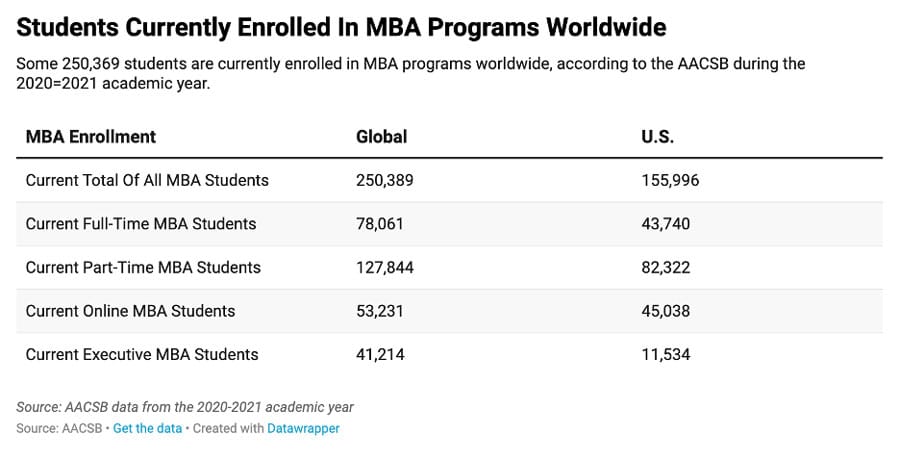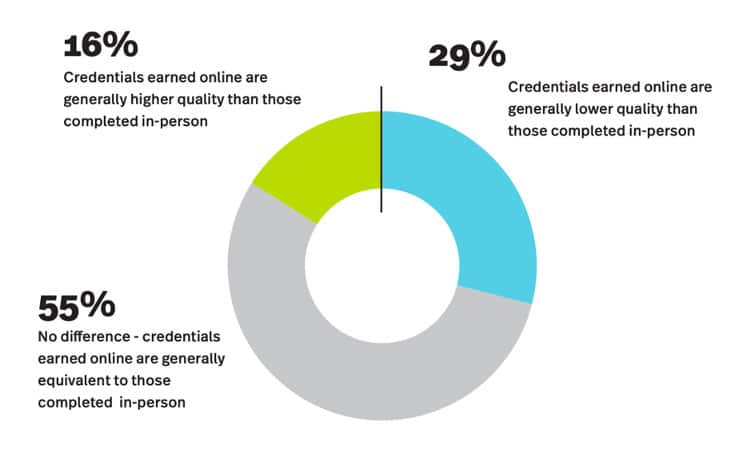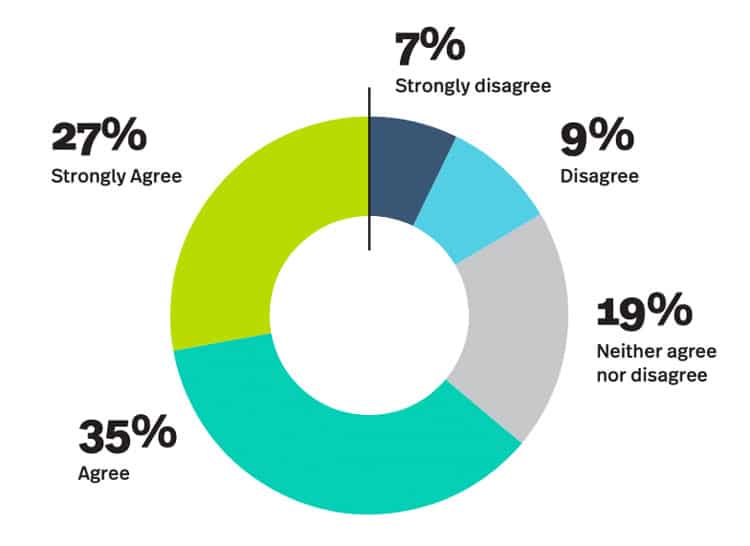Online degrees gaining new prominence because of the pandemic
- Demand for online degrees picked up steam during the pandemic and is on an upwards trajectory
- One reason more students are enrolling in online degrees is that employers are much more likely to think highly of these degrees than they were a few years ago
- Institutions and agents that can offer online degrees as well as in-person study abroad experiences to international students have tremendous opportunities going forward
Online degrees are gaining enrolments, and respect from employers, and the trend carries exciting implications for educators, agents, and international students alike.
Last year, US educators enrolled more students in online MBAs than in MBAs delivered in person, a development linked to pandemic realities but also to the increasing acceptance of online degrees from employers.
In 2020/21 in the US, 45,040 students were enrolled in online MBA programmes compared with 43,740 attending full-time residential programmes, according to the Association to Advance Collegiate Schools of Business (AACSB).
Elsewhere in the world, the ascent of online MBAs is slower to take shape, but there is still massive uptake of these digital degrees: 53,280 students compared with 78,060 for traditional MBAs.

Experts believe low unemployment rates are part of the reason for the dramatic shift; workers are eager to stay in their jobs but also want to further their education and careers. Sarah Perez, managing director of MBA programmes at the University of North Carolina’s Kenan-Flagler Business School, told Forbes magazine that,
“The need for learning flexibility, even beyond evening/weekend in-person delivery, is very attractive for folks in many industries. Labour markets globally are strong, so the need for flexibility extends beyond national boundaries, too. During the pandemic, more people became comfortable with the concept and reality of online learning.”
Then, of course, there is the affordability factor: many online degrees are a fraction of the cost of in-person degrees.
Students’ uptake of online MBAs would certainly not be so robust if employers still considered these digitally acquired degrees to be inferior to residential degrees. But employers’ acceptance of online degrees has grown substantially over the past few years. In 2021, 71% of employers responding to a survey by the Center for the Future of Higher Education and Talent Strategy said that they consider the quality of online business degrees to be equal to – or better than – the quality of traditional programmes.

The new respect for online business degrees dovetails with employers’ plans to rely more on remote workforces. That same survey found that 52% said hiring employees who mostly work remotely will be central to their companies’ operations and staff recruitment strategies going forward.

Online degrees gained in stature during the pandemic
The disruption that was already underway in education, for example MOOCs, was accelerated during the pandemic because many online programmes had a quality edge over in-person programmes that struggled to make the transition to digital formats. W. Brooke Elliott, executive associate dean for academic programmes at University of Illinois at Urbana Champaign’s Gies School of Business explains:
“The education market was changed dramatically by the pandemic. Even the strongest residential programmes with the greatest reputations … didn’t have the expertise or the capacity to, on the fly, develop and deliver a high-quality [programme] that was designed to be online.”
As a result, both students and employers became more aware that there are excellent, high-quality online programmes. For many international students, there is a particularly important dimension: they can now obtain reputable degrees without needing to travel outside their country. This not only takes out the cost of flights and living overseas, but it also frees them up to work part-time, or full-time, in jobs with none of the restrictions that are imposed by visa rules in destination countries. Students who cannot afford study abroad or can’t go for other reasons are able to obtain ever-more prestigious online degrees from foreign institutions.
Opening up a new recruitment angle
For educators and agents, this is a massive development. On the one hand, new interest in online degrees potentially cuts into the pool of international students who would otherwise elect to study abroad through whatever means possible (loans, scholarships, etc.). But on the other, the audience of international students has become vastly larger because it contains an important new segment.
Mat Jacobson, CEO and founder of Ducere Global Business School, spoke at ICEF Toronto last week in a session entitled “Student recruitment for online degrees: How to build a successful business model and generate significant revenue.” Mr Jacobson noted that one reason for schools and universities to supplement their on-campus offerings is to appeal to a different segment of international students. He provided the example of two students with different profiles: an 18-year-old with financial means who can’t wait to be immersed in a foreign culture, and a 35-year-old who is working in a business and has three kids whose circumstances prevent them from studying abroad for a couple of years. Mr Jacobson said,
“Ultimately being able to offer both those students programmes [one on-campus, one online] means that you convert a higher percentage of students.”
The potential is huge: estimates are that for every international student who can afford to study abroad, there are four others who cannot. That much larger, additional pool of students represents a significant opportunity, to say the least, for schools and universities that can offer high-quality online degrees. The students in this market are motivated by affordability, flexibility, and the ability to improve their careers and income.
Should agents jump on board?
For agents wondering if they should expand their business by promoting online degrees, Mr Jacobson says there is real upside. Given that they have already sunk costs into attracting students to walk into their office in the first place to learn about study abroad, agents have nothing to lose, and no new costs, by supplementing their portfolio with online options. In fact, they have a lot to gain.
Until very recently, agents had to face the unfortunate reality that many of their students would walk out the door and quite likely give up on their dream of earning a foreign degree because they could not afford study abroad. But now, agents who have compelling online options to present gain the opportunity of generating income – that would otherwise have been zero – and helping students to enrol in degrees that will enrich their lives.
Mr Jacobson used a car brand metaphor – Ford vs. Ferrari – to make his point about the wisdom of agents deciding to promote online degrees. Agents can still earn the best commissions from moving students into a study abroad experience (the Ferrari), but their pool of “Ferrari” students will be much smaller than their “Ford” segment (i.e., of students wanting to study abroad but finding it too expensive). The Ford segment is large, and it’s a volume business. As Mr Jabobson noted, “Ford makes a lot more money than Ferrari does” because a lot more Fords are sold than Ferraris.
Ultimately, providing and marketing online degrees, for educators and agents alike, should be about more than money. At Ducerne, “we love what we do because we’re expanding access to education” for students. Expanding the number of international students who can obtain foreign degrees – whether in-person or online – is meaningful work that carries with it great potential for improving the lives of students and their families.
For additional background, please see:
















